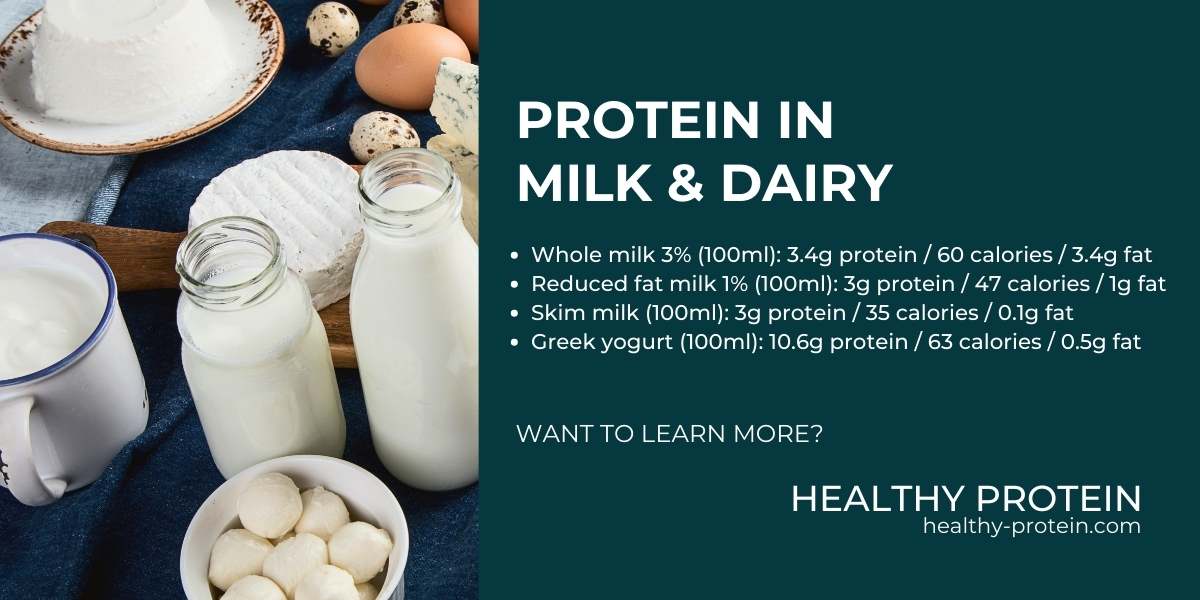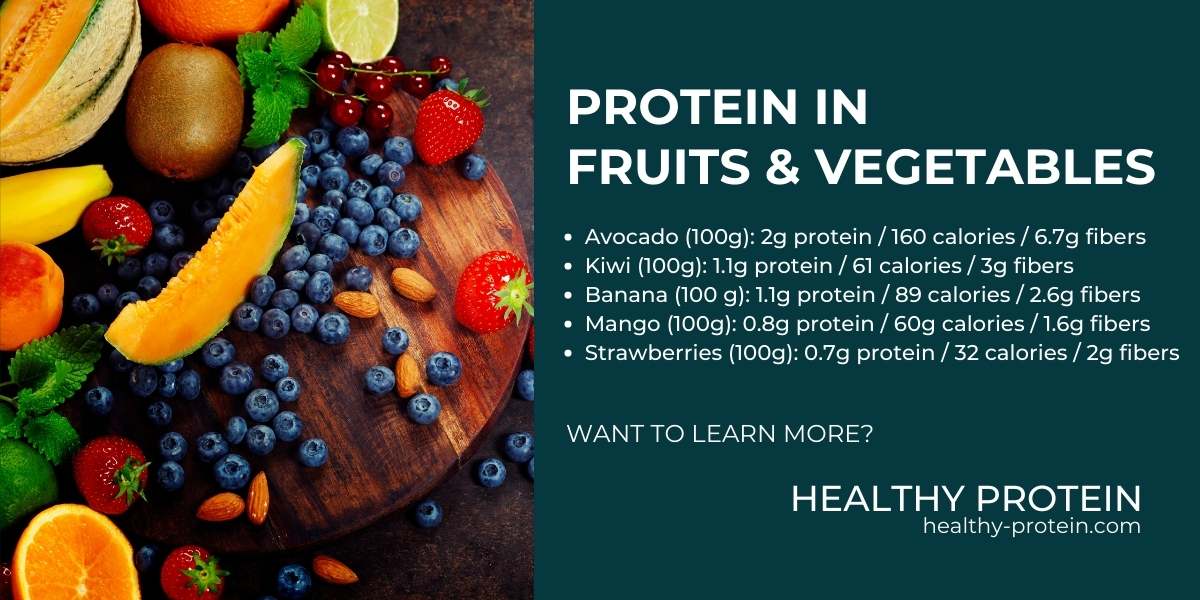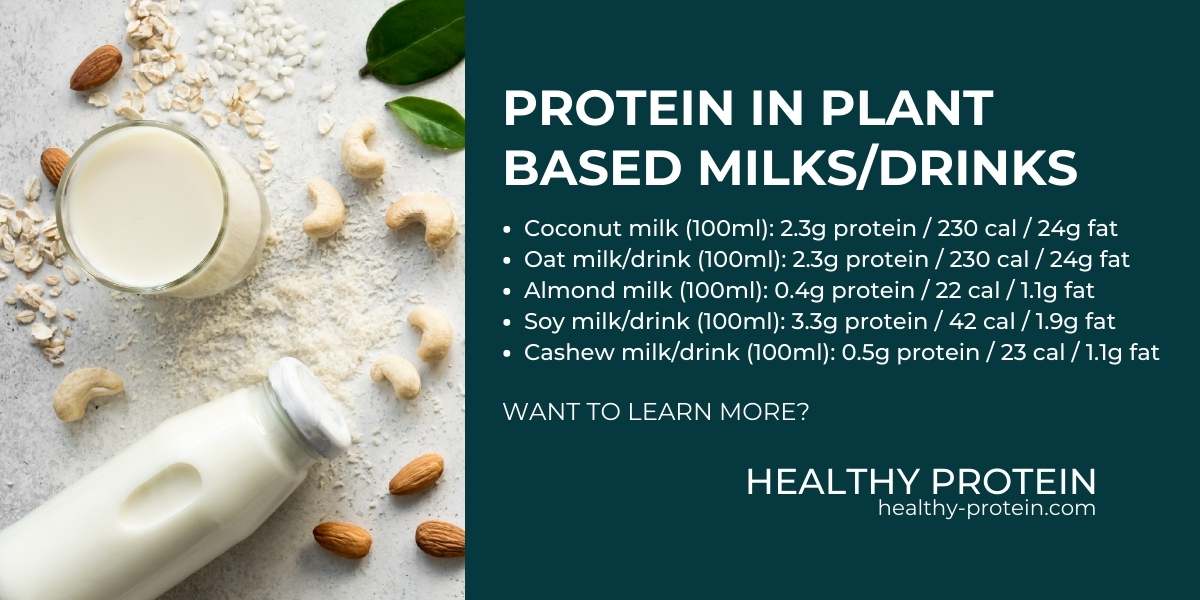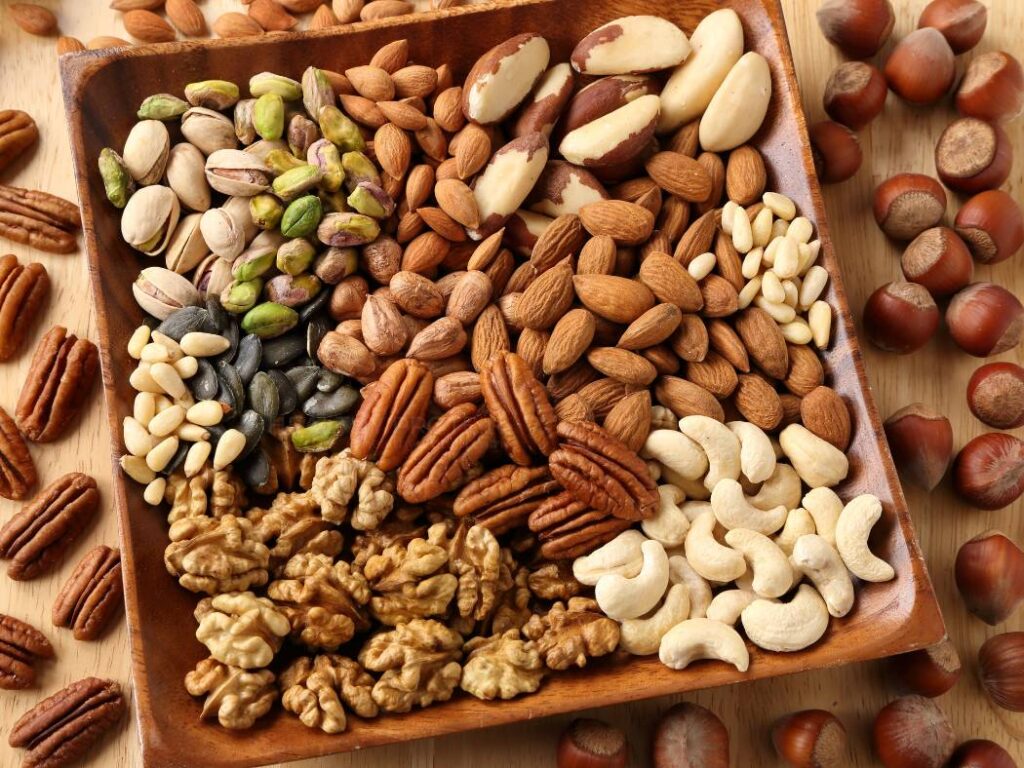Protein In Nuts & Seeds (Vegan Protein Source)
Nuts and seeds are one of the best sources of proteins but should be added by caution because of their relative high fat consistency. Be aware that not all blenders can handle hard products such as nuts, coffee and cocoa beans, so it’s always better to check the manual of your blender before to avoid getting a bad consistency in your smoothie or in the worst case blunt the blades of your blender. It can be better to use a grinder for hard products for the best results.
- Peanuts (20 grams): 5.2g protein / 113 calories / 10g fat
- Almonds (20 grams): 4.2g protein /116 calories / 10 fat
- Cashews (20 grams): 4g protein / 111 calories / 8.8g fat
- Chia seeds (20 grams): 3g protein / 97 calories / 6.2g fat
- Hemp seeds (20 grams): 6g protein / 110 calories / 10g fat
Protein In Milk & Dairy Products
Adding a dairy product will not only make your smoothie taste better, but also create a silky smooth texture to bring it all together! Dairy products can be great protein sources as well. Both full-fat and non/low-fat dairy foods can be good sources of protein, calcium, B vitamins, and vitamin D.
- Whole milk 3.25% (100ml): 3.4g protein / 60 calories / 3.4g fat
- Reduced fat milk 1% (100ml): 3g protein / 47 calories / 1g fat
- Skim milk (100ml): 3g protein / 35 calories / 0.1g fat
- Greek yogurt nonfat (100ml): 10.6g protein / 63 calories / 0.5g fat

Protein In Fruits & Vegetables
Fruits & vegetables might not have the most proteins, but even the smaller numbers in many ingredients combined will add up to numbers which might surprise you! Additionally the fruits in your smoothie will boost it with freshness, lots of flavor as well as vitamins, minerals and dietary fiber, which makes them mandatory to add in any smoothie or shake 🙂
- Avocado (100g): 2g protein / 160 calories / 6.7 g fibers
- Kiwi (100g): 1.1g protein / 61 calories / 3g fibers
- Banana (100 g): 1.1g protein / 89 calories / 2.6g fibers
- Mango (100g): 0.8g protein / 60g calories / 1.6g fibers
- Strawberries (100g): 0.7g protein / 32 calories / 2g fibers
- Pineapple (100g): 0.5g protein / 50 calories / 1.4g fibers

Plant Based Milks/Drinks
Plant based drinks are a great substitute for milk and dairy products, in case you’re lactose intolerant, vegan, or just prefer to avoid dairy products. Some plant based drinks such as coconut milk or almond milk also can give a pleasurable nutty kick to your smoothie. I definitely recommend trying different options to find your favorite.
- Alpro coconut drink (100ml): 0.1g protein / 20 calories / 0.9g fat
- Coconut milk (100ml): 2.3g protein / 230 calories / 24g fat
- Unsweetened oat milk/drink (100ml): 2.3g protein / 230 calories / 24g fat
- Almond milk/drink (100ml): 0.4g protein / 22 calories / 1.1g fat
- Soy milk/drink (100ml): 3.3g protein / 42 calories / 1.9g fat
- Cashew milk/drink (100ml): 0.5g protein / 23 calories / 1.1g fat

Leafy Greens
Adding leafy greens to a smoothie will give an interesting texture for your smoothie and add an extra power kick of freshness to it! The most popular options of greens that can be added to smoothies are usually spinach leaves or kale, but honestly most sorts of leafy greens will do the trick. There’s not much protein in greens, but the vitamins and extra fibers together with the punch of freshness which they bring, is a definite recommendation to add to your smoothies.
- Spinach (100g / 3.5 cup): 2.9g protein / 23 calories / 2.2 g fibers
- Kale (100g / 5 cups): 2.9g protein / 35 calories / 4.1 g fibers
Protein Powder for Smoothies & Shakes
A scoop of protein powder in your smoothie is a comfortable option catching your daily missing proteins, but keep in mind that it shouldn’t be taken as a substitute for a proper meal. There’s a long list of protein powders to choose from and there really isn’t a right choice – it all comes down to you and your dietary preference.
Common advice while choosing a brand of protein powder, is to always check for the ingredients to see that it doesn’t include a lot of added sugar or other unhealthy ingredients which could result in high calories and low nutritional value. Always be mindful about what you’re eating and do your own research before adding anything into your smoothie.
To make it easier for you to find your favorite and do your own research, we’ve made a list of some popular protein powder choices to choose from.
- Whey protein (25g / one scoop): 21g protein / 103 calories / 1.9g fat
Vegan & vegetarian protein powders:
- Pea protein (30g / one scoop): 24g protein / 116 calories / 1.7g fat
- Brown rice protein (30g / one scoop): 23g protein / 127 calories / 0.6g fat
- Hemp protein (30g / one scoop): 14g protein / 122 calories / 3.8g fat
- Soy protein (30g / one scoop): 27g protein / 108 calories / 0,5g fat
Thanks for reading our post about great protein sources and protein powder substitutes. Feel free to share it with your friends and family. Next time you fire up your Nutribullet or Vitamix definitely check out our smoothie recipes for some inspiration.
Best High Protein Smoothie Recipes
Now that you know how to add more protein to smoothies you might wonder what are the best high protein smoothie recipes. We have something for every mood from classic strawberry banana smoothie to healthy green smoothie. Give them a try and have a great productive day!


7 Responses
[…] own special recipe to surprise your friends and family with! Also we have gathered info for the best protein sources so you can plan your protein intake more […]
[…] snack after gym. For finding tips and tricks about protein smoothies, be sure to check out our “High Protein Sources For Smoothies & Shakes” […]
[…] Also if you want to add more protein to the mix have a look at this great article: High Protein Sources For Smoothies & Shakes (Without Protein Powder) […]
[…] For great protein sources for smoothies check out our article: High Protein Sources For Smoothies & Shakes (Protein Powder Substitutes) […]
[…] the best overview of proteins in smoothie ingredients with some great tips, be sure to read our “High Protein Sources For Smoothies & Shakes” […]
[…] Overnight oats are perfect for losing weight, as they are high in quality fibers and proteins and low in sugars and fats. Depending on your dietary goals, you’ll have a chance to do a higher calorie version by adding more fruits, seeds, protein powder or yogurt or a lower calorie version without them. Additionally it’s a great fit for fitness enthusiasts to gain muscle, as it’s quite simple to pack overnight oats full of proteins with some extra protein powder, nuts or dairy products with a high protein consistency. Read more about protein rich food sources here. […]
[…] Additionally, for more smoothie protein sources check out our post: High Protein Sources For Smoothies & Shakes (Protein Powder Substitutes) […]